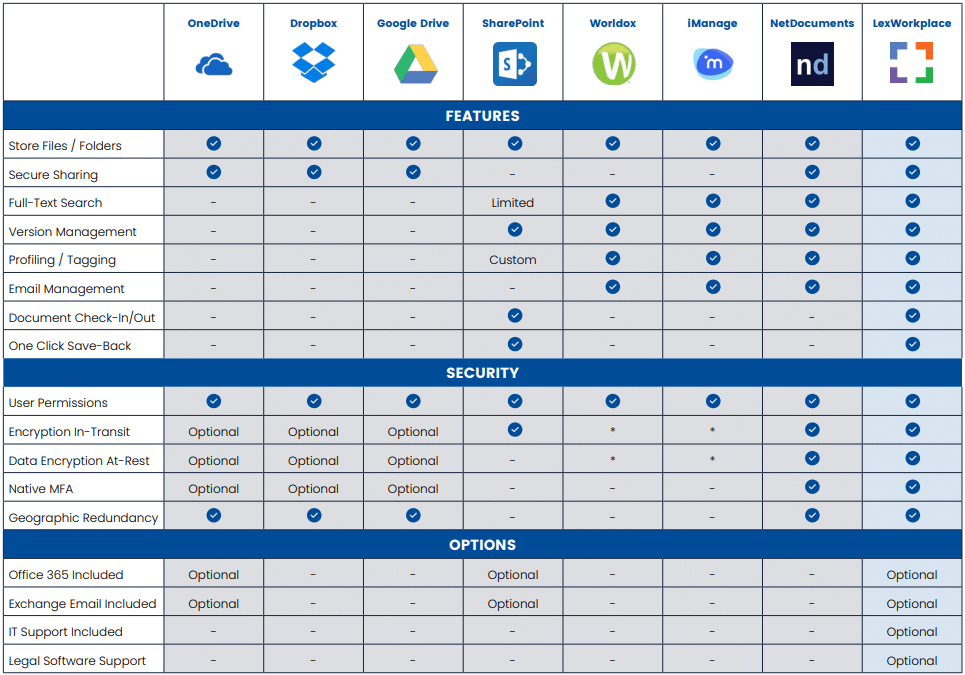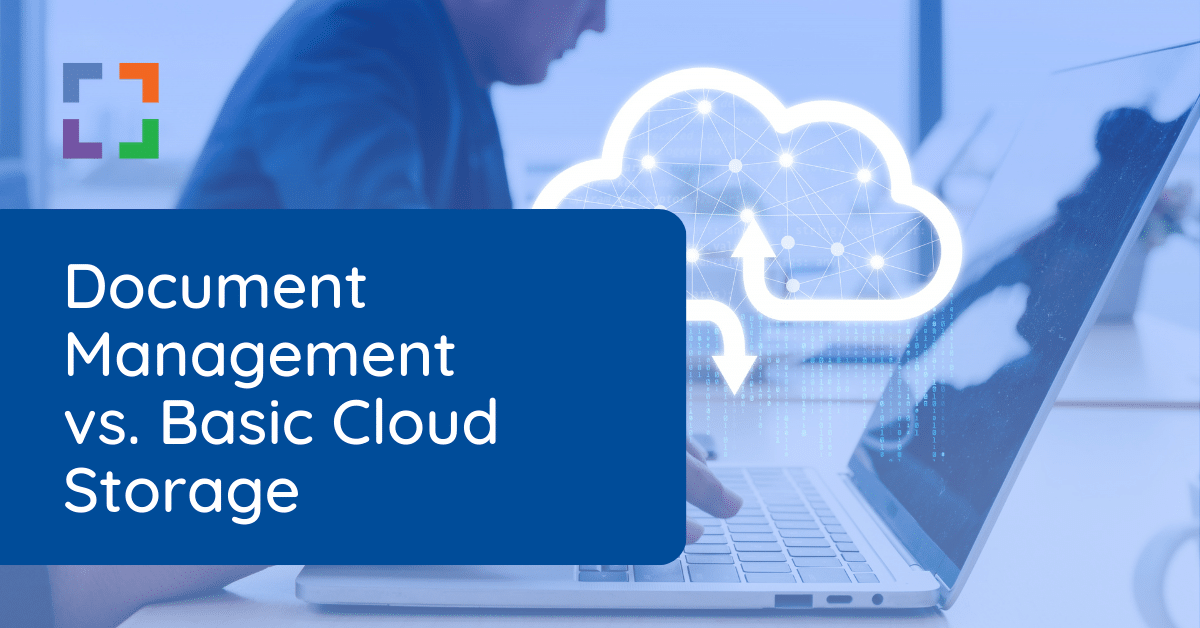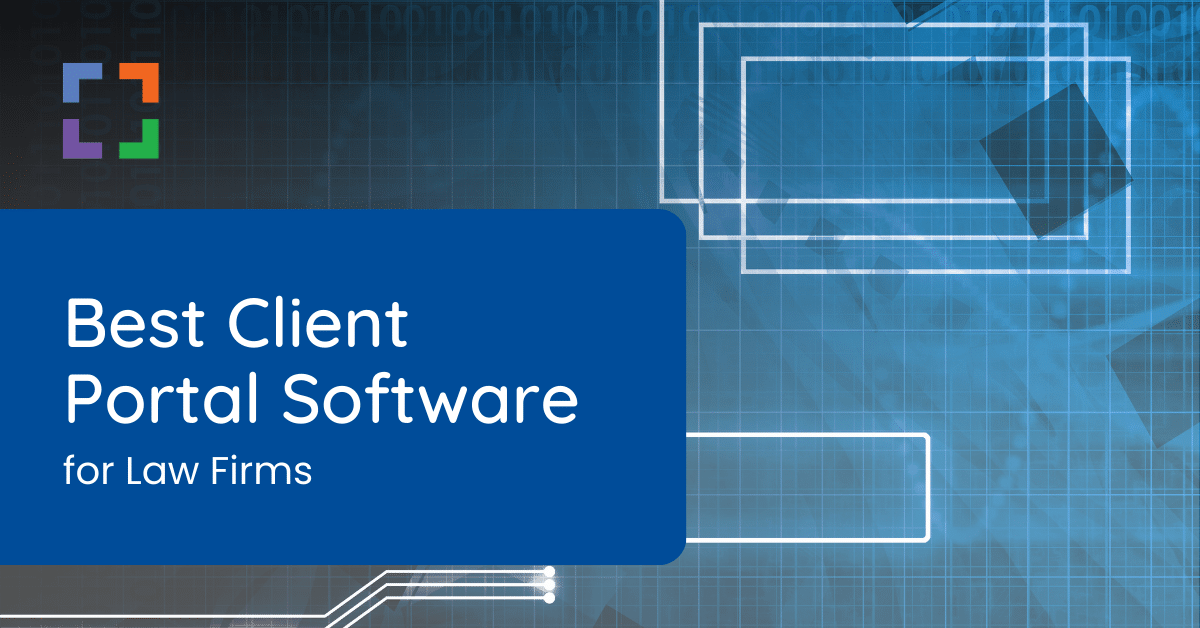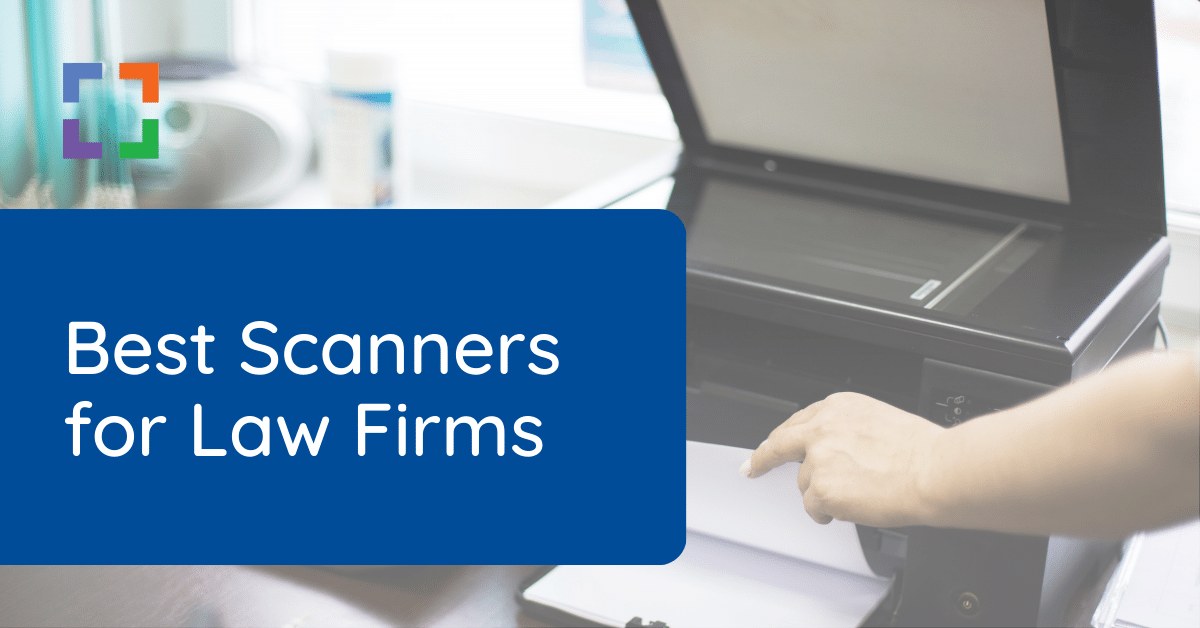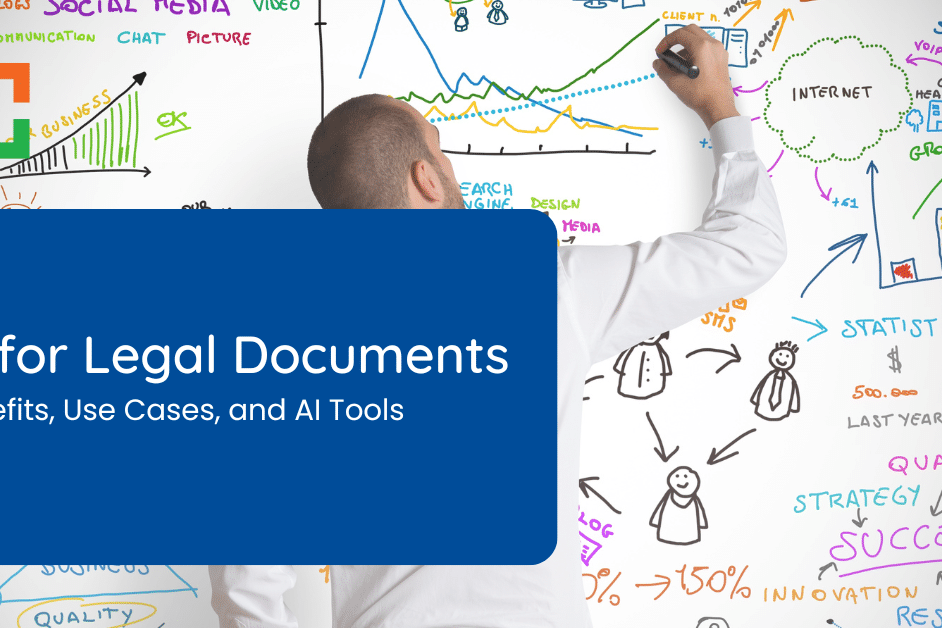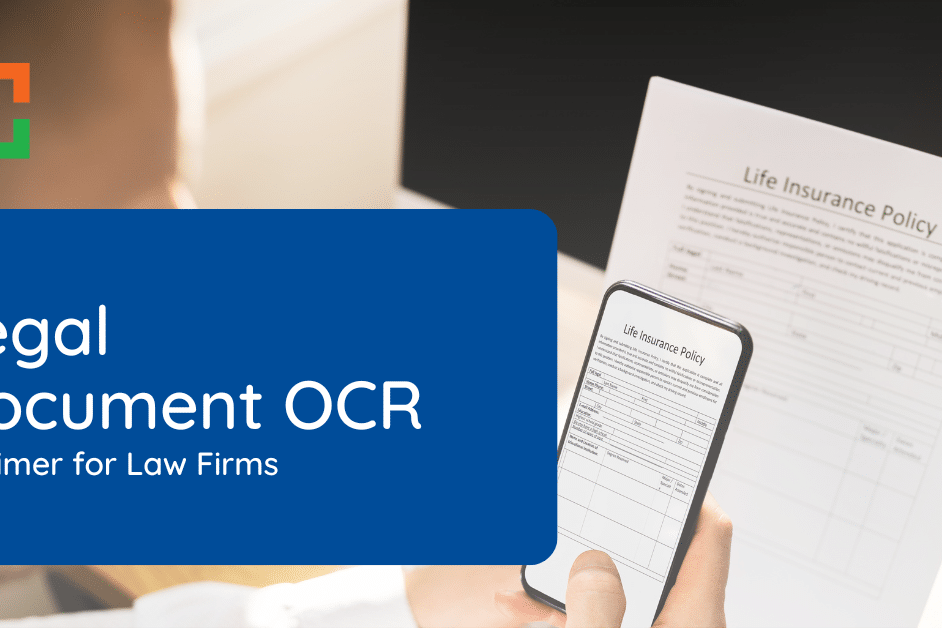Best Legal Document Management Software for 2024
This is an in-depth analysis and review of the best Legal Document Management Software for law firms in 2024.
We assess the top legal DMS products today, based on user feedback and market share, to assist law firms in choosing the best software for their needs.
In order to help you with that, we’ve developed our Document Management Software Comparison Chart.
As you can see from the chart, different software offers different features.
Your job is to use this chart to compare your list of prioritized features with the list of features named here. Then, you can figure out which software best suits your firm.
Want to delve deeper into the comparison? Consider downloading our full Document Management Software Comparison Chart below.
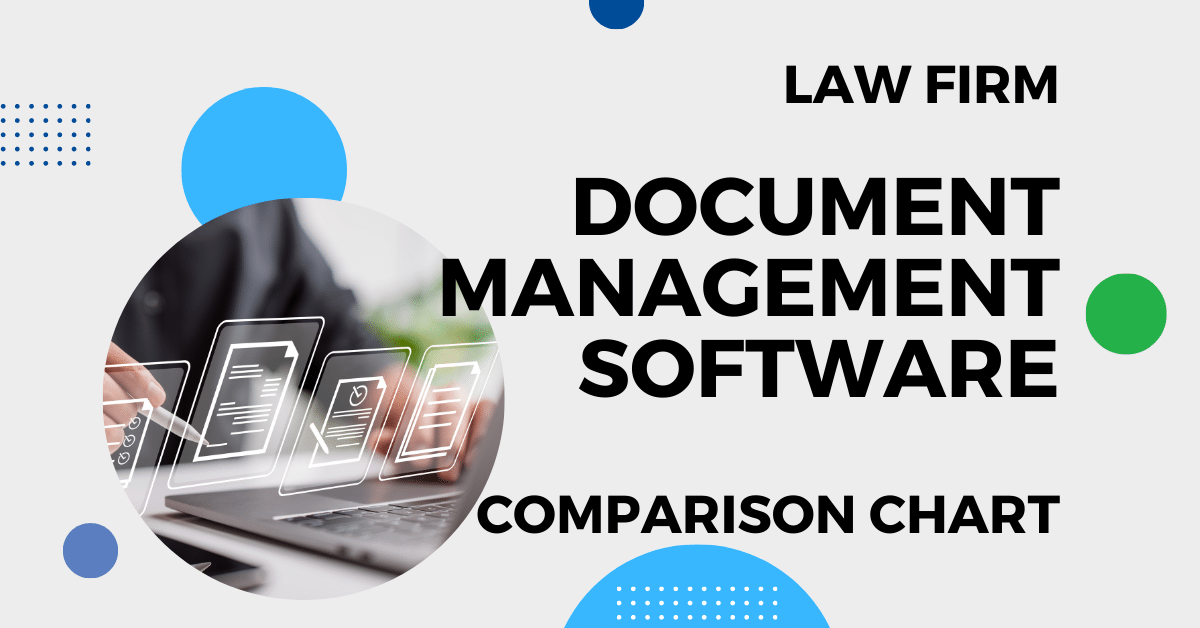
Compare the leading Document Management software used by law firms.
Best Legal Document Management Software for 2024 - The List
Note: Features and pricing are determined from a combination of our own account and discussions with authorized consultants for these products.
These specificities may change over time.
LexWorkplace

LexWorkplace is legal-centric, cloud-based document and email management software.
Pricing: Starts at $395 / month for a 3-User Plan.
- LexWorkplace, made for law firms, organizes documents and email by Client and Matter.
- LexWorkplace works natively on Windows and Mac computers.
- LexWorkplace includes Email Management, allowing you to save emails to a matter.
- LexWorkplace includes full-text search by client, matter, documents, email or across the entire system.
- Data stored in LexWorkplace is secured with two-factor authentication, data encryption in-transit and at-rest, and by geographically redundant data centers.
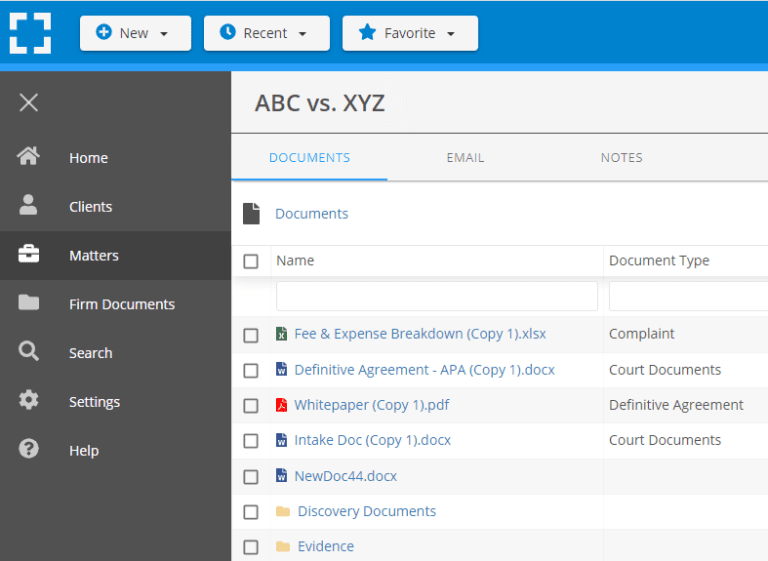
Key Features
- Store Files / Folders
- Secure Sharing
- Full-Text Search
- Version Management
- Profiling / Tagging
- Integrated OCR
- Email Management
- Document Check-In/Out
- One Click Save-Back
- User Permissions
- Data Encryption
User Reviews
James: "Easy to use and reliable."
"LexWorkplace is to access, simple to use and simple to organize. It allows thousands of documents to be stored in an organized manner with complete flexibility for organizing clients and matters. The "tag" feature and other file labels are customizable to allow for information about the status of a matter to be known at a glance. Perhaps the best feature of LexWorkplace is that is is a very stable platform with virtually no downtime. The developers are not constantly tweaking the interface so that there is no need to constantly adjust your interaction with the platform."
Verified User: "Not for solo endeavors."
"I am a solo-member law firm, so this wasn't the best deal for me. The demo looked promising but you do need to go through Uptime if you want the software."
(Source: Law Firms from Software Advice)
LexWorkplace Success Story
See how one law firm uses LexWorkplace to organize their documents and streamline their practice.
Book a 15-Minute Demo
iManage Work

iManage Work is premise-based document management and knowledge management software.
Pricing: Not Provided by Publisher (Reseller Required)
- iManage Work is a powerful DMS and ECM platform that runs on an on-premise server.
- iManage also offers a hosted option for an additional monthly fee.
- iManage Work has a powerful full-text index engine which powers its search feature.
- iManage Work requires significant server infrastructure to run adequately and is best suited for large law firms.
- iManage Work requires a specialized IT consultant to implement and administer the platform.
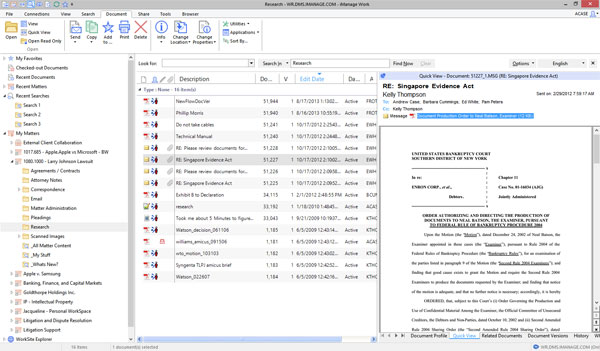
Key Features
- Store Files / Folders
- Full-Text Search
- Version Management
- Profiling / Tagging
- Email Management
- User Permissions
User Reviews
Evan: "iManage is the premier DMS."
"Once iManage is setup, it works. Especially the cloud format. It allows the storage and tracking of documents with easy and powerful search tools."
Francis: "iManage Work Site Review."
"1)Expensive 2)limitation on customization 3)There are about a dozen different config files to maintain, and the most important one is dynamically modified by Autonomy itself while it runs. Which means that it is impossible to automate the configuration or keep the configs in versioned source control. Even `cp *.cfg ~/cfgbak/` won't help you roll back a change, because it is never safe to restore a previous config. You'll be using `diff new.cfg old.cfg` a lot. 4)Many features are poorly documented, leading to lots of back and forth with the support department just to answer basic questions like "what does this error code in my logs signify?"
(Source: Law Firms from Software Advice)
ProLaw

ProLaw is a combination Practice Management, Document Management and Accounting solution for law firms.
Pricing: Not Provided by Publisher
- ProLaw is owned by the same parent company as Westlaw legal research.
- ProLaw is Practice Management software (first), with an optional DMS module.
- ProLaw's Document Management module isn't as robust as stand-alone DMS software, it's good if your firm needs an all-in-one solution.
- ProLaw is on-premise software, which means it requires a sophisticated server or private cloud to run.
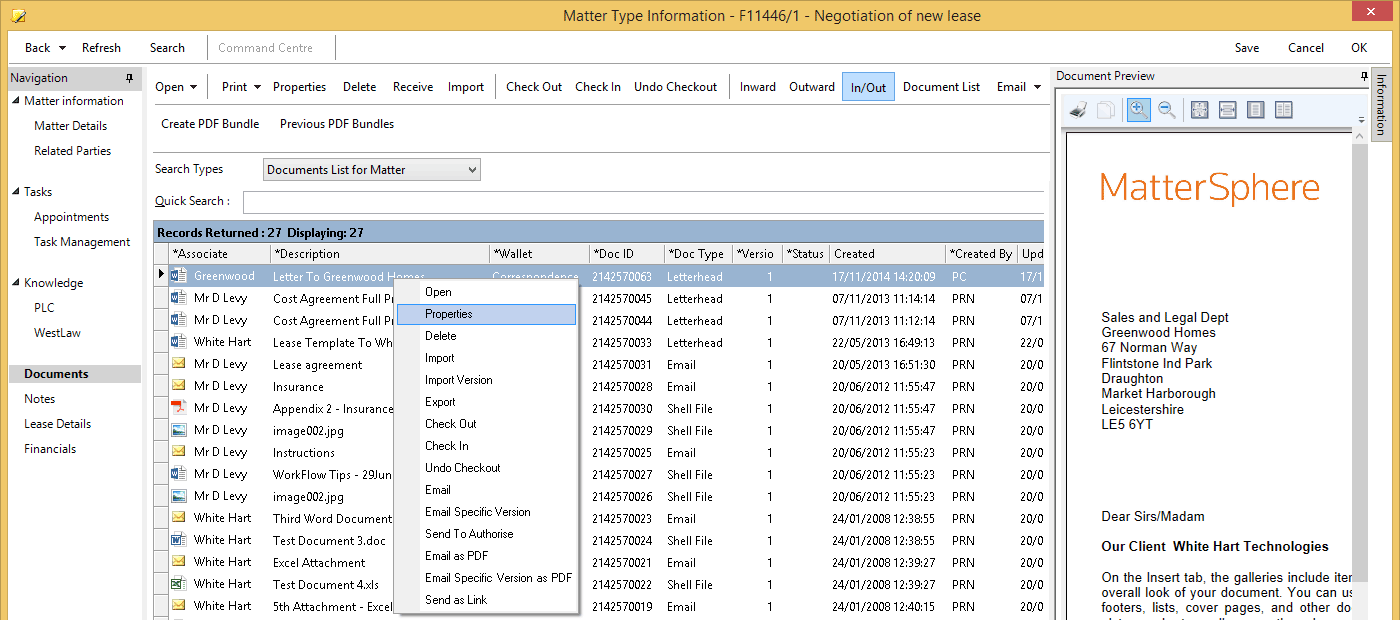
Key Features
- Store Files / Folders
- Full-Text Search
- Version Management
- Profiling / Tagging
- Email Management
- User Permissions
User Reviews
Cy: "Opinions on Prolaw."
"Overall Prolaw is a nice piece of software. There are very few packages out there that integrate front office and back office. Particularly for accounting. Its a one-stop shop for us."
Mellissa: "Amazing Feature, but difficult and time consuming execution."
"Profiling items to the case is time consuming. You are limited on how to set up your folders. If you practice more than one area of law, the lack of customization is very restricting."
(Source: Law Firms from Software Advice)
eDOCS
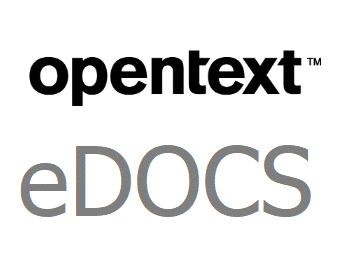
Opentext eDOCS, is a long-time Enterprise Content Management (ECM) system used by a variety of industries, including law firms.
Pricing: Not Provided by Publisher
- eDOCS was formerly known as Hummingbird before it was acquired by OpenText.
- eDOCS includes basic Document Management and Records Management capabilities.
- eDOCS is popular with in-house legal departments, typically of very large companies.
- The eDOCS user interface includes a user-customizable tile-based interface.
- eDOCS is premise-based, which means it requires an onsite server to run.
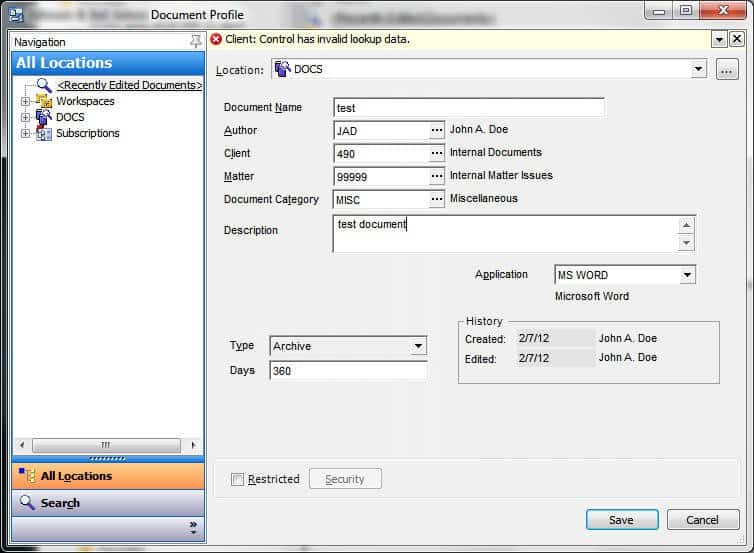
Key Features
- Store Files / Folders
- Version Management
- Document Check-In/Out
- Profiling / Tagging
- Outlook Collaboration
- User Permissions
User Reviews
Nicole: "eDocs is a feature rich software that provides our business with peace of mind for our data."
"I enjoy the ability to work online and offline with my documents and know that they are backed up automatically when I connect to the Internet. Before eDocs we had a hard drive die and the data was not recoverable. Now that we have eDocs that is no longer an issue."
Thayanne: "Essential for large companies."
"Very complex to move, it is necessary to study and see tutorials and yet you may find it difficult, very bureaucratic, it does not have easy access."
(Source: Law Firms from Capterra)
Worldox

Worldox is long-running legal document management software.
Pricing: $425 per user license + $88 / User / Year
- Worldox is premise-based, which means a capable on-premise server is required to run it.
- Worldox also offers a hosted option for an additional monthly fee, though this option has recently been sunset.
- Worldox allows you to create custom metadata fields which must be completed for every document stored.
- Worldox organizes data into Cabinets, which can be organized to represent different departments, teams or projects within your business.
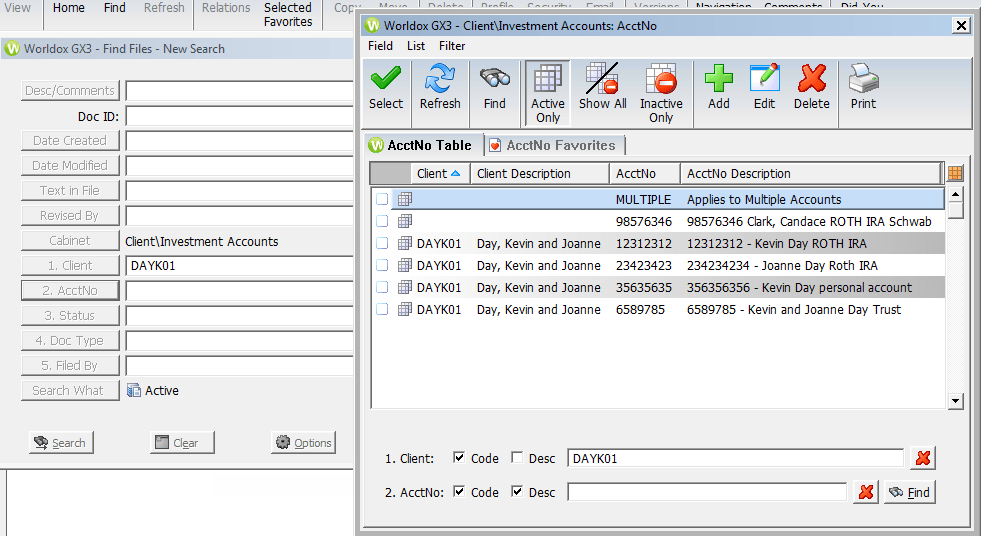
Key Features
- Store Files / Folders
- Full-Text Search
- Version Management
- Profiling / Tagging
- Email Management
- User Permissions
User Reviews
Kathy: "Overall a useful document management system."
"The search function proved very useful when using Worldox. The ability to narrow a search down to a certain parent folder or subfolder and/or use a search term in the title or name field was helpful. I used the search function almost daily."
Talia: "Truly the least intuitive program I've ever used to sort files."
"This software looks like it was made in 1985 and it doesn't function much faster than a snail. It has preset configurations and it 100% drives me crazy. I just learned from my boss the other day that apparently if you haven't used a button in a while, it just GOES AWAY. How does a button just GO AWAY. Every time you try to make a decision it makes you verify it a second time, which is absolutely just a time waster. It is horrible at sorting and anytime I try to run a query it just isn't able to find the files I want. When I'm saving things from my computer it works maybe half the time."
(Source: Law Firms from Software Advice)
As Worldox Phases Out, Consider LexWorkplace, as this Reviewer has:
“Best replacement for Worldox out there. From the moment I reached out, until just moments ago when I was asked how everything was going, it’s been wonderful. Everyone is invested in making LexWorkplace the best DMS out there.“– Kathleen N. via Capterra
NetDocuments

NetDocuments was among the first cloud-based document management applications.
Pricing: $50 to $65 / User, 3 or 5 User Minimum
- NetDocuments is used by a variety of industries, including legal, financial services and manufacturing.
- Being web-based, NetDocuments does not require an on-premise server, nor does it require software installation.
- NetDocuments also includes ndOffice, its software for Microsoft Office integration.
- NetDocuments does not work on Mac computers, apart from using Parallels to run a full Windows installation.
- NetDocuments requires hiring a third-party consultant/reseller to implement the software.
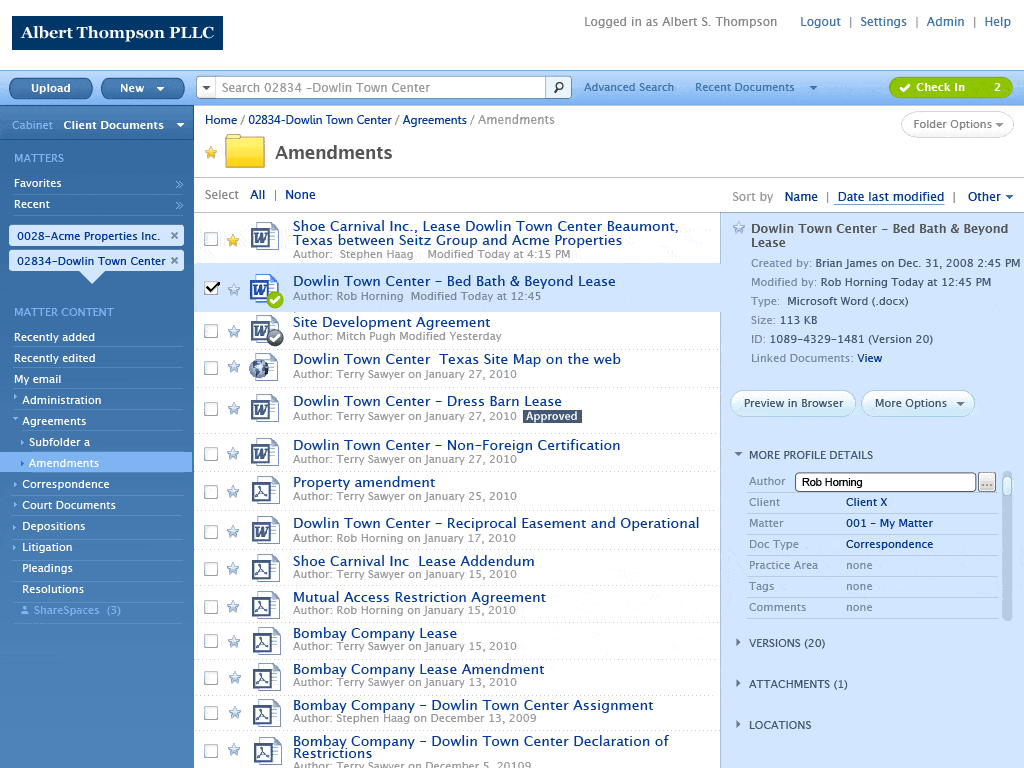
Key Features
- Store Files / Folders
- Full-Text Search
- Version Management
- Profiling / Tagging
- Email Management
- User Permissions
User Reviews
BreAnne: "Great way to securely share and store documents."
"This software makes it very convenient to keep all documents organized by user or client and has many features which can be used to ensure the security of the documents."
Vika: "difficult to use, expensive, but secure."
"How clunky and difficult to use it is. Also, how difficult it is to learn, especially the admin side - it's like doing things on DOS - you have to know what you're doing. It's not intuitive at all."
(Source: Law Firms from Software Advice)
SharePoint

SharePoint is Microsoft’s Document Management and Intranet platform.
Pricing: SharePoint Online starts at $5 / User / Month
- SharePoint is an optional element of the Microsoft 365 productivity suite.
- SharePoint is a cloud-based Intranet, company portal and lightweight Document Management System that can be used by any industry.
- SharePoint allows you to create lists (database tables) and libraries (document repositories).
- SharePoint is very customizable, allowing you to create database tables, lists and document repositories that fit your business.
- SharePoint is not configured for law firms or structured by client or matter out of the box, and therefore requires customization by an expert to be useful.
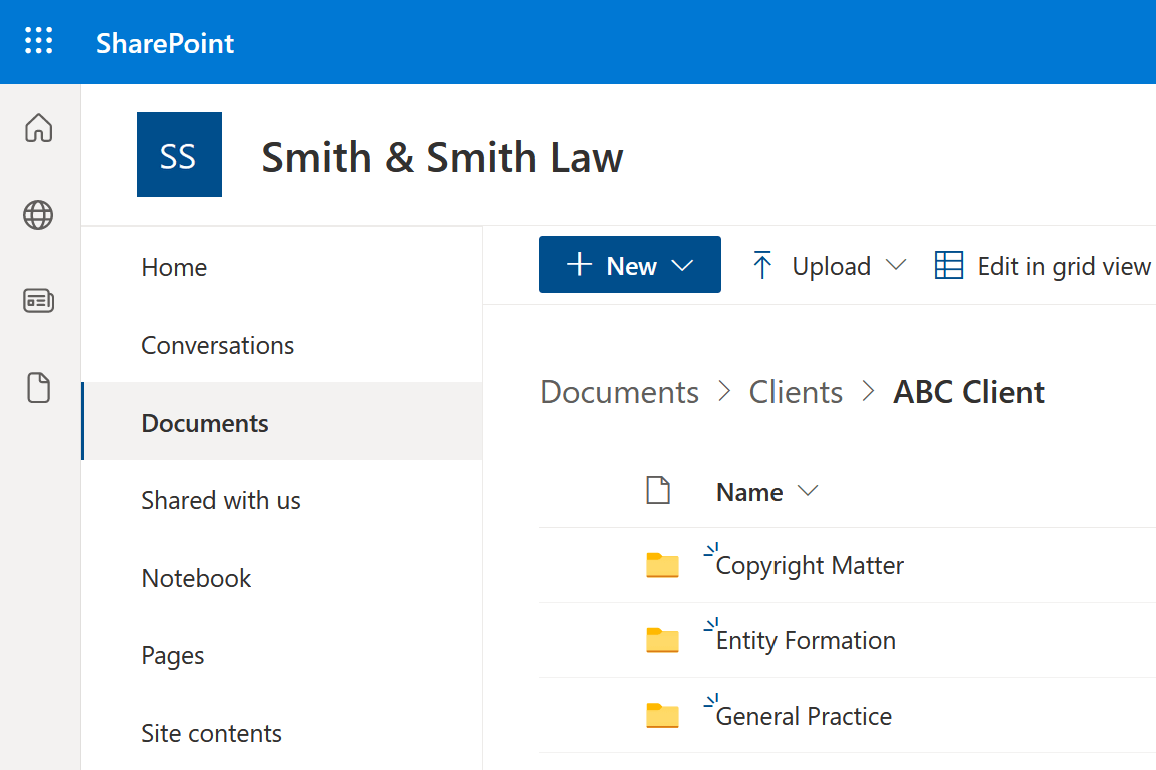
Key Features
- Store Files / Folders
- Full-Text Search
- Version Management
- Profiling / Tagging
- Email Management
- User Permissions
User Reviews
Mohammad: "Collaboration is Key!"
"As a number of our employees work remotely, the use of SharePoint really helps us share and collaborate in documents as if we were physically sharing. We are able to collect and store all our work that is important to our workflow and our clients."
Margurite: "Great Baseline Collaborative Remote Office Environment."
"I did find a significant learning curve when working in SharePoint. The back end and setup/optimization don't feel super intuitive to me, but that could be because I don't have a ton of experience in building network structures, etc. I would like to see more of a plug and play approach in the future to make it easier for laymen to be able to get a group up and running."
(Source: Law Firms from Software Advice)
SmartVault

SmartVault is a cloud-based document management system and client portal.
Pricing: Starts at $20 / User / Month.
Full functionality starts at $40 / User / Month.
- SmartVault specializes in online document management and secure file sharing solutions.
- It integrates the security features of document management systems with client portal accessibility.
- Emphasizes compliance and data protection, suitable for various professional sectors.
- Offers industry-specific solutions, adaptable to different business needs.
- Provides cloud-based services, focusing on accessibility and security in diverse work environments.
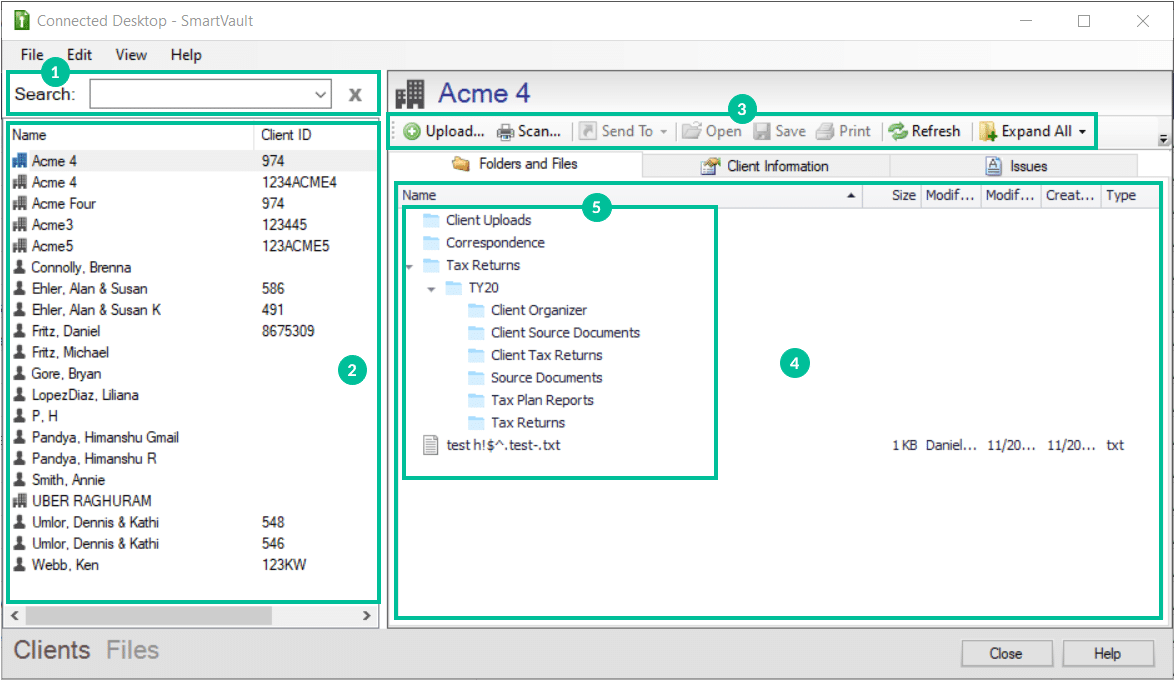
Key Features
- Store Files / Folders
- Full-Text Search
- Version Management
- Profiling / Tagging
- User Permissions
- Encryption
User Reviews
Joe: "Great integration with our tax software."
"The features most liked about SmartVault for us has been the ease of initial installation, the integration with our Intuit ProSeries Software and how it has helped our office move to the cloud for a safe secure location for our data."
Anastasia: "AWFUL Customer Support."
"We started using smartvault about 3 years ago and it is a great software/cloud organization for an accounting practice UNTIL something goes wrong. The customer service is terrible, the wait to talk to someone could take hours and they would promise a call back but it wouldn't happen. So you call back, get another promise and it doesn't happen again. In the meantime, your whole workflow is suffering. It has been a month and I am still waiting..."
(Source: Law Firms from Software Advice)
OpenKM

OpenKM Document Management System helps you organize, maintain, and govern documents.
Pricing: Must contact OpenKM for pricing.
- OpenKM provides a Document Management System (DMS) designed to streamline the handling of documents.
- The system includes features like automatic cataloging, metadata capture, and Optical Character Recognition (OCR).
- Supports advanced previews, version control, and tracking for comprehensive document management.
- Facilitates integrations with third-party applications and supports various networking protocols.
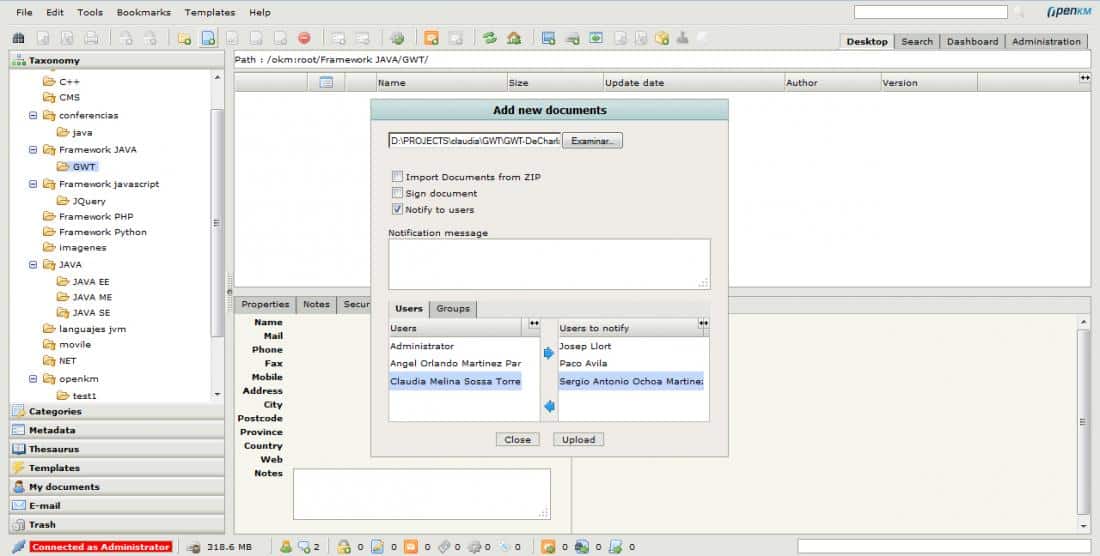
Key Features
- Store Files / Folders
- Full-Text Search
- Version Management
- Profiling / Tagging
- User Permissions
- Encryption
User Reviews
Michael: "Good for building a searchable PDF database."
"Drag and drop from file explorer is a huge plus for our non-tech savvy users. Adding a tag to each PDF for future recall is good if you don't want to OCR everything. Up time is excellent. Over the last ~2 years, we have gone down maybe twice, and neither time was for more than an hour. Very dependable."
Ben: "OpenKM Experience."
"The application was written with discrepancies such as: • The Copy and Move command behave differently as it relates to inheriting permission in the target folder. The Move command should work like copy with the option to clone security. • Email: When sending an email from the Write Email icon, the emails get saved in the Email section below Taxonomy. However, when emails are sent via Send link or Send document attachment or Notification, they are not saved in the email folder. All emails and notifications should be saved in the email section. • Stamping: Text stamps do not have the option to choose a page or page range, but Image stamps do. All stamps should have the option to apply to a specific page or range. • Stamping: All stamps - be able to set the default page number when creating the stamp."
(Source: Law Firms from Software Advice)
A Deep Dive into Legal Document Management
As you evaluate your options from the list above, continue reading for more vital information on document management software.
The following information is dedicated to educating law firms on the various aspects of document management, so you’ll have a complete picture when choosing the best DMS for your law firm.
Overview of Legal Document Management Software
Additional Information
Who This Overview is For
It’s time to modernize your law firm: implement a Document Management System to keep your firm’s documents organized and searchable.
As you saw, there is no shortage of options when it comes to legal document management software. There are old products and new products. Premise-based solutions and cloud-based products.
This article is for law firm owners, managers and administrators that feel “there must be a better way” when it comes to managing the firm’s growing set of documents, email and other content.
This includes:
- Law firms looking for a better solution than basic Windows folders.
- Law firms looking to for a better system than “the S: Drive” to manage documents.
- Law firms looking to graduate from basic cloud storage solutions.
- Law firms looking to upgrade from their old, dinosaur DMS.
- Law firms looking to implement their first legal document management software.
- Anyone looking for document management systems for small law firms.
Are any of these you?
If so: we have you covered. Here we provide an overview of and additional resources for the best legal document management software in 2024.
Want to Learn More about Document Management Software?
Get in Touch!
Defining Legal Document Management Software
Many types of software and services are casually referred to as “document management” but aren’t.
Legal document management software, also known as a Document Management System, is software (cloud-based or on-premise) that not only stores your law firm’s documents but provides a comprehensive set of tools to find, organize and manage your documents.
This is in contrast to basic file storage systems (which do little more than hold your files), or even law practice management applications that provide built-in, but basic, storage of your documents.
Here are some common misconceptions of true legal document management software:
- OneDrive, Google Drive and Dropbox are not Document Management Systems.
- Your on-premise file server (ie: “The S: Drive”) is not a Document Management System.
- Practice Management applications that include basic file storage are not Document Management Systems.
Semantics don’t matter but functionality does.
We’ll further define what makes a DMS a DMS below in Document Management Features.
Legal Document Management Software - Related Resources
Related – Best Legal Billing Software: Learn about your options for managing clients while generating invoices, reports, and more.
Related – Document Management Software vs. Basic Cloud Storage: Learn the differences between cloud storage and true Document Management.
Related – Best Law Firm Software: See our comprehensive list of the best software for law firms, by category.
Why Most Law Firms Should Use Document Management Software
Law firms handle a large amount of sensitive and confidential information on a daily basis. This information includes client documents, legal briefs, contracts, and other important documents that are critical to the operations of the firm.
They’re often comparing different documents too. In order to effectively manage and organize this information, law firms should consider using document management software.
Document management software is a tool that allows users to easily store, organize, and retrieve electronic documents.
It offers a variety of features, including the ability to search for documents using keywords, categorize documents by client or case, and even set up automatic reminders for important deadlines. To dig into this, check out our article on Document Management System Benefits.
For now, let’s discuss some of the reasons for why law firms should implement a true Document Management System:
- Increased efficiency and productivity: Document management software allows staff members to quickly and easily search for and retrieve documents, leading to faster turnaround times and improved client satisfaction.
- Improved security: Document Management Security offers numerous advanced features such as encryption and user-level access controls to ensure that only authorized personnel can access sensitive documents, reducing the risk of data breaches and protecting the firm’s reputation.
- Compliance with regulations and industry standards: Many software solutions come with built-in compliance features that can help a law firm meet regulatory requirements and industry standards, such as HIPAA and the GDPR, reducing the risk of legal penalties and fines.
- Cost savings: Document management software can reduce printing and storage costs and decrease the need for additional staff members to handle document management tasks, saving the firm money on labor costs.
- Improved organization and document classification: Document management software allows for easy organization and classification of documents by client or case, making it easy for staff members to find and access the documents they need. Additionally, it also allows for categorization of documents, this makes it easy to find specific documents and keep track of the document’s history. This feature helps in maintaining the structure and continuity of the document and reduces the chances of errors.
Related: Best Client Portal Software for Law Firms: A list of the best client portal software for law firms.
Legal Document Management Software - A Guide to Features
Generally speaking, legal document management software is special software that stores your documents and provides tools to manage them.
The ‘manage’ part of document management software’s capabilities is what sets it apart from using a basic on-premise file server or simple cloud storage.
Document management software can come in either an on-premise variety (installed on your own local servers) or can be cloud-based.
The scope, features and capabilities of any given legal document management software varies from product to product; though broadly speaking, DMS software should perform the following functions:
Document & File Storage
The basic storage of documents and other types of electronic files.
Document Profiling / Metadata
The ability to apply attributes (metadata) to documents, including document classifications, types and tags, as well as the ability to apply internal notes to documents. For instance, the ability to classify a document as a contract or an order.
Full-Text Search
The ability to search across all documents (and sometimes email), including the file name, metadata and content of documents.
LexWorkplace Top Features
- Full-Text Document Search
- Automatic, Integrated OCR
- Secure Cloud Storage
- Client/Matter-Centric Org
- Secure Client Sharing
- MS Office Add-In
- Email Management
- Windows + Mac Compatible
Unique Document ID
Every document is assigned a unique ID, which does not change even if the file name or location of the document does.
Document Check-Out / In
The ability to check a document out, prohibiting others from changing it while the document is checked out to you.
Microsoft Office Integration
Direct integration with the Office suite, typically including Microsoft Word and Outlook.
Document Version Management
The automatic creation and tracking of versions of documents as they are changed.
Email Management
Learn more about Email Management for Law Firms.
Permissions & Access Management
The ability to permit (or restrict) access to particular matters or data within your firm.
Favorite & Recent Documents
Quick and easy access to recently accessed documents, as well as the ability to "pin" documents as a favorite.
Matter Notes
The ability to create and save Matter Notes within the DMS software.
More modern, cloud-based Document Management Systems sometimes include these more sophisticated features:
Full Windows & Mac OS Compatibility
Native Windows and Mac support, without the need for virtualization software (such as Parallels).
Practice Management Integration
Integration with your chosen Law Practice Management software such as Clio Manage.
Automatic, Integrated OCR
The ability to convert scanned document images into searchable, text-based PDFs.
Geographic Data Redundancy
Automatic replication/backup of your data to geographically redundant data centers.
End-to-End Data Encryption
Full encryption of your data in-transit and at-rest, adding enhanced security and compliance.
Multi-Factor Authentication
MFA, requiring a second factor to log into the system, enhancing security and compliance.
If you want to dive deeper, check out our article on Document Management System Features.
Related: Law Practice Management Software
Many Practice Management applications describe “document management” as among the features their software provides.
This often misleads or confuses potential buyers, as the phrase “Document Management” strongly insinuates the rich capabilities of a true DMS, whereas Practice Management software almost always provides only rudimentary document management.
You’ll often see “Document Management” listed as a feature, when really the Practice Management software includes functionality more akin to basic cloud storage (like Dropbox or Google Drive), rather than true legal document management software capabilities.
This is important to understand when evaluating a document management system for small law firms.
However, if you’re looking for Legal Matter Management, you could be referring to Practice Management and/or Document Management.
Ultimately, Matter Management is defined as how your firm particularly needs to handle matters from start to finish. It’s important to learn about the differences, and to ensure you’re getting the right software.
- Related: Legal Matter Management Software.
When Do You Need Legal Document Management Software?
If your law firm currently uses something other than a bona fide Document Management system for small law firms, you may be wondering whether or not you should make the jump into a true DMS. Or posed another way: When do you actually need to get dedicated Document Management software?
In our experience, a law firm should seriously consider implementing a DMS when any of the following situations are present.
1. Your Files/Documents are Fragmented and Scattered
If your firm is struggling with matter and firm documents in too many different systems (for instance: a file server, in OneDrive, and in your case management software), it’s likely time to centralize everything into a DMS.
Your new Document Management System will serve as the hub of your law firm, and the “single source of truth” when it comes to documents and email.
2. Your Filesystem is a Wild West of Unstructured Folders
Most basic file-and-folder systems start out well-organized enough.
Perhaps you create a folder per client, or per matter, or both. Inevitably, over time, not everyone in your firm follows the protocol for creating and naming folders, and organizing documents… and over time, your file system becomes a mess, and finding the client matter or document you’re looking for becomes a mess.
A good, law-firm-centric legal document management software platform will enforce a clear Client/Matter-centric hierarchy for documents and email, keeping your data organized with 10 or 10,000 matters.
Bring Law and Order to Your Documents
LexWorkplace Includes:
- Document Profiling / Metadata
- Structured by Client/Matter
- Organize With Folders and Tags
- Save Emails to Matters
- Built-In Version Management
- Add Notes to Docs & Email
- Automatic, Integrated OCR
3. You Need to Classify and Annotate Documents
Basic file systems like file servers and simple cloud storage don’t provide much in the way of metadata.
Metadata is simply a way you can apply attributes to a document that are about the document. For instance, you may want to classify a particular word document or PDF file as a motion. Doing so in a law firm Document Management System makes the document readily identifiable as a motion, and allows you to filter, sort or search for all documents of that type.
A good law firm Document Management System will allow you to apply document types, status (EG: Draft, Final, or Filed) as well as internal notes visible only to your team.
4. You’re Aiming for a Paperless Law Firm
If your law firm still manages all of your documents in hardcopy form, you have likely struggled to find documents and stay totally organized. This methodology of document management gives way to lost contracts, wasted time, and impeded productivity.
For these reasons, I definitely recommend having a mostly or completely Paperless Law Firm. Digitizing your files can be done over time, and you can set up the future of your firm to be more digital.
Then, once you have your files on your computer, you can use a proper DMS to manage your past and future documents.
Related – Scanners for Law Firms
Explore your options for scanners based on the needs of law firms and your firm particularly.
5. You Need Robust Search
Basic file systems are also notoriously bad at giving you the ability to search through all of your data.
Suppose you have thousands of documents (or more), and even more emails saved over the course of many years. You’ll almost certainly need the ability to search through all of your data–documents, metadata, email and notes–including the content of every document. That means: every word on every page of every file.
A good document management system for small law firms will give you Google-like search capability across all of your data. A really quality legal document management software platform will let you filter or search by matter, document type, author and more.
How to Evaluate Legal Document Management Software
Once you’ve determined that your law firm needs Document Management software, the next step is to develop a shortlist of candidates to evaluate.
Here’s how to evaluate Document Management Systems for your law firm.
Part of this process of evaluation is reading case studies provided by your top contenders. Document Management Case Studies serve the purpose of displaying a company’s success through their clients’ success.
By reading these case studies, you can draw parallels between your firm and others’ to find a company that works best for you.
After you’re done evaluating your options for a Legal DMS, the next step is Implementing a Document Management System.
This process can be intricate, so ensure that you have the right process to follow.
Why You Should (Probably) Implement Cloud-based Legal Document Management Software
In this article, we’ve done our best to explore all legal document management software strategies from a neutral, unbiased perspective.
The truth is, however, that for most law firms, life is better in the cloud.
In the past few years, as firms have transitioned to the cloud from traditional document management systems – particularly premises-based server systems – the effect on productivity, service levels, and general efficiency has been profound.

Almost all law firms see the benefits of locating, accessing, creating, editing, saving, sharing, and storing documents more effectively by the transition to the cloud – in the process providing greater flexibility, data security and IT efficiency.
Such is the transformational power of cloud-based legal document management software that it has been a key differentiator in the success of many law firms that have made the switch.
We believe it is no exaggeration to say this: Law firms that have taken the necessary steps to modernize in this way have been able to spend more time on winning cases for clients and less time on administrative and IT headaches.
Let’s be more specific about these benefits.
We could write a novel on the benefits of cloud-based software and file storage. For this overview of legal document management software, we’ll cover the top 6 benefits of implementing a cloud-based Document Management System.
1. Data Security
With the proper law firm Document Management platform, your data (firm data, client data) is orders of magnitude more secure than it would be sitting on your in-house file server. A reputable document management system for small law firms will include:
- Complete Data Encryption In-Transit
- Complete Data Encryption At-Rest
- Multi-Factor Authentication (MFA)
- Geographically Redundant Backups / Data Centers
- User / Group Permission Management
Compare this level of security and compliance to your own server in-house (even an expensive, well-maintained on-premise server infrastructure).
Cloud-based tools provide all the security you’ll need, often out-of-the-box.
2. Work Anywhere
It’s obvious but worth stating: Cloud-based legal document management software will enable your entire firm to work anywhere. Your team members will have the exact same access to client, matter and firm documents at home as they would in the office, without sacrificing security.
In today’s hybrid work environment, it’s more important than ever to give your team the tools they need to serve your clients, anytime, anywhere.
Related Video:
Law Firms: Why You’re Struggling to Work from Home
As you start to appreciate and even enjoy working from home, or anywhere else, another opportunity opens up for you.
Virtual Law Firms are more viable than ever before.
With the correct software and technology strategy, you can enjoy benefits such as flexibility, cost-effectiveness, and overall happiness for your firm and your clients.
Learn more below.
Related – Virtual Law Firm: A Complete Guide
Explore the possibilities of a Virtual Law Firm – the why and how.
3. Reduced Risk of Data Loss
With server-based setups, it’s easy for data loss to occur if the backup procedure is not followed, breaks down, or if there is a server problem.
With a cloud-based system, there is no single point of failure. By storing documents in the cloud, data loss risks are lowered because the provider stakes its reputation on providing a stable, robust, and secure platform.
With cloud-based document management systems, your data will be automatically replicated and stored across multiple, geographically dispersed data centers.
If you keep all of this in mind while considering the graph below, you can conclude that with each subsequent year that you own a server, you assume more and more unnecessary risk.

4. Lower IT Costs and Fewer Headaches
Server-based document management systems require considerable IT oversight.
A law firm’s functionality depends greatly on being able to reliably access, create, and collaborate on legal documents. IT consultants regularly need to be called in to ensure everything is functioning smoothly.
Headaches and hiccups with server maintenance are common. This can get expensive, especially for smaller law firms. What’s more, IT problems are a huge distraction, keeping law firm managers from focusing on growing their firm and serving their clients.
With cloud-based legal document management software, there are no servers to own or manage and no software to install and keep updated on each of your computers.
While the ongoing headaches and costs are good enough reasons to consider a virtual desktop over an on-premise server, let’s also remember the typical upfront costs of just a few on-premise servers. Keep in mind – servers incur ongoing costs, and the higher your company scales up, the more servers and cost you will have to take on.

5. Save/Manage Emails in the Same System as Documents
For many law firms, email management alone is enough to make the jump into a Document Management System for small law firms. With the right law firm DMS, you can quickly save and file relevant emails to the appropriate matter, right from Outlook.
Then, all documents and email for any given matter is neatly stored in one place, searchable and accessible to your entire firm.
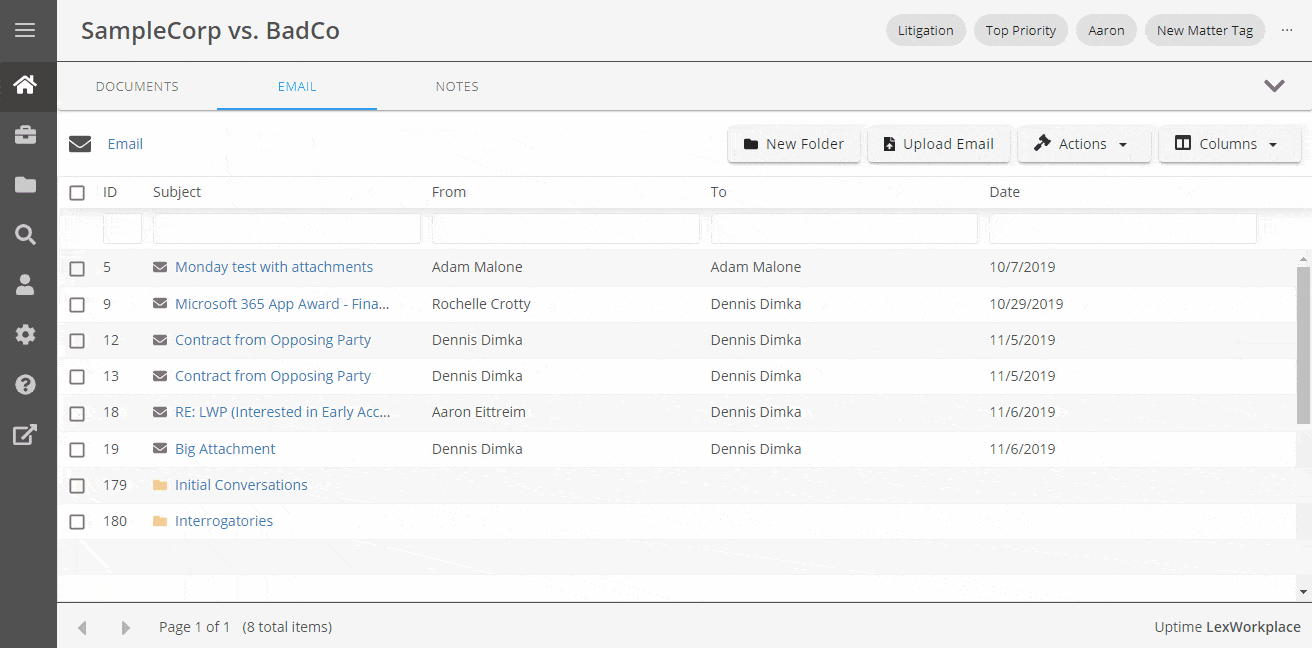
6. Software Updates are Automatic
As is the case with any cloud-based software, cloud-based legal document management eliminates any need to manually update software on your server(s) and desktop computers. Cloud software publishers typically release new features (and bugfixes) on a routine basis, with no action required from you.
7. Scalability
Cloud-based software, and in particular cloud-based legal document management software, are infinitely scalable. Need more space for a big case you just took on? Chances are you can add storage in minutes. Have five new people join your team? Add them to your software and they’re up and running. All without the need to pay for expensive server infrastructure upgrades.
Conversely, if your needs decrease, with most cloud-based Document Management applications, you can scale resources (storage, users) down as needed, and pay only for what you need.
Closing the Loop
We hope you found this guide on finding the right document management system for small law firms helpful. If you have any questions, would love some guidance, or want to talk through your options, please feel free contact us.
Related – 12 Ways LexWorkplace Will Help Your Firm Do More with Less
See 12 ways LexWorkplace will streamline your law office.
Frequently Asked Questions - Legal Document Management Software
Legal document management software, also known as a Document Management System (DMS), is a solution that stores, organizes, and manages a law firm’s documents.
It offers several benefits, including increased efficiency, improved security, compliance with regulations and industry standards, cost savings, and better organization and document classification.
Unlike basic file storage systems or practice management applications with built-in storage, a true DMS provides a comprehensive set of tools to find, organize, and manage your documents, ensuring greater functionality and efficiency.
Key features of DMS include document and file storage, document profiling or metadata, full-text search, unique document ID, document check-out/in, Microsoft Office integration, document version management, email management, permissions and access management, and favorite/recent documents.
Cloud-based DMS offers benefits such as full Windows and Mac OS compatibility, practice management integration, geographic data redundancy, end-to-end data encryption, and multi-factor authentication.
The top legal document management software for 2023 includes Worldox, LexWorkplace, iManage, ProLaw, NetDocuments, eDOCS, SharePoint, and eFileCabinet.
It’s important to research each application and visit the publisher’s website to determine the best fit for your law firm.
Data security and compliance are paramount in the legal industry due to the sensitive nature of the information handled by law firms. Legal Document Management Software, depending on which software you choose, can enhance data security and compliance in several ways:
- Encryption: Legal DMS offers end-to-end encryption, ensuring that data is secure during transmission and while at rest. This protects confidential client information from unauthorized access and cyber threats.
- User Permissions: Through customizable user permissions, law firms can control who has access to specific documents and data. This feature is crucial for maintaining client confidentiality and complying with legal standards.
- Audit Trails: Legal DMS provides detailed audit trails, recording who accessed or modified a document, at what time, and what changes were made. This feature is essential for accountability, non-repudiation, and in some cases, compliance with legal standards.
- Compliance Management: Many Legal DMS solutions are designed to help law firms comply with industry regulations and standards, such as HIPAA, GDPR, and others. They may include features that assist with document retention policies, e-discovery, and legal holds.
By utilizing a Legal DMS, law firms can significantly enhance their data security measures and compliance protocols, safeguarding their client’s information and maintaining trust.
Dependent on which Legal Document Management Software you choose, the right DMS can be instrumental in promoting collaboration and enhancing productivity within law firms in the following ways:
- Centralized Document Storage: Legal DMS provides a single repository for all documents, which means that team members can quickly and easily access the necessary files from anywhere, anytime. This centralized approach eliminates the inefficiencies of scattered documents and ensures that everyone is working on the most up-to-date version.
- Real-Time Collaboration: Many Legal DMS platforms offer real-time collaboration tools, allowing multiple users to work on the same document simultaneously. This feature is invaluable for team projects, document reviews, and contract negotiations.
- Version Control: Legal DMS maintains a history of all changes made to a document, allowing users to track edits and revert to previous versions when necessary. This feature prevents the confusion of multiple document versions and ensures the integrity of legal documents.
- Automated Workflows: Legal DMS can automate routine tasks and workflows, such as document approvals, signature collections, and retention policies. By automating these processes, law firms can save time, reduce human error, and allocate resources to more critical tasks.
By fostering a more collaborative environment and streamlining document-related workflows, your Legal DMS becomes an essential tool for improving productivity and efficiency within law firms.
Looking for Document Management Software?
LexWorkplace:
Modern Document Management for Law Firms
LexWorkplace is document & email management software, born in the cloud and built for law firms. Here’s a quick primer on how it works.
Organize by Client & Matter
Organize documents, email and notes by client or matter. Store and manage all data for a case or project in one place.
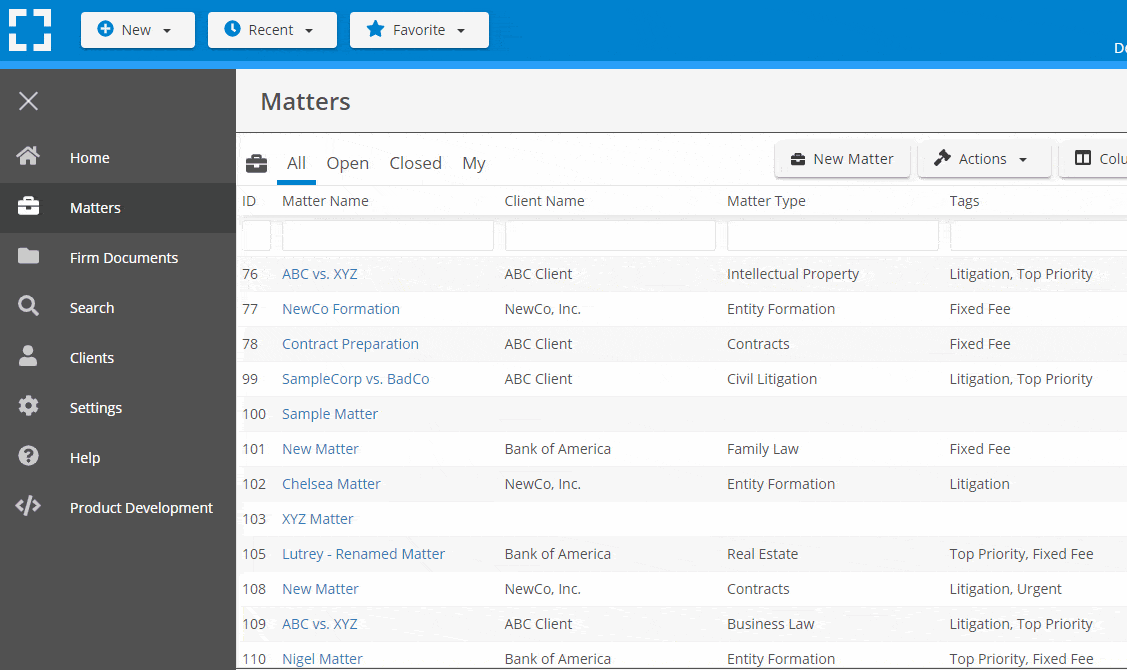
Go Beyond Basic Files & Folders
Supercharge your firm’s productivity with true DMS functions.
- Version Management
- Document Tagging & Profiling
- Document Check-Out / Check-In
- Microsoft Office Integration
- Automatic, Integrated OCR
- Convert Word Docs to PDF
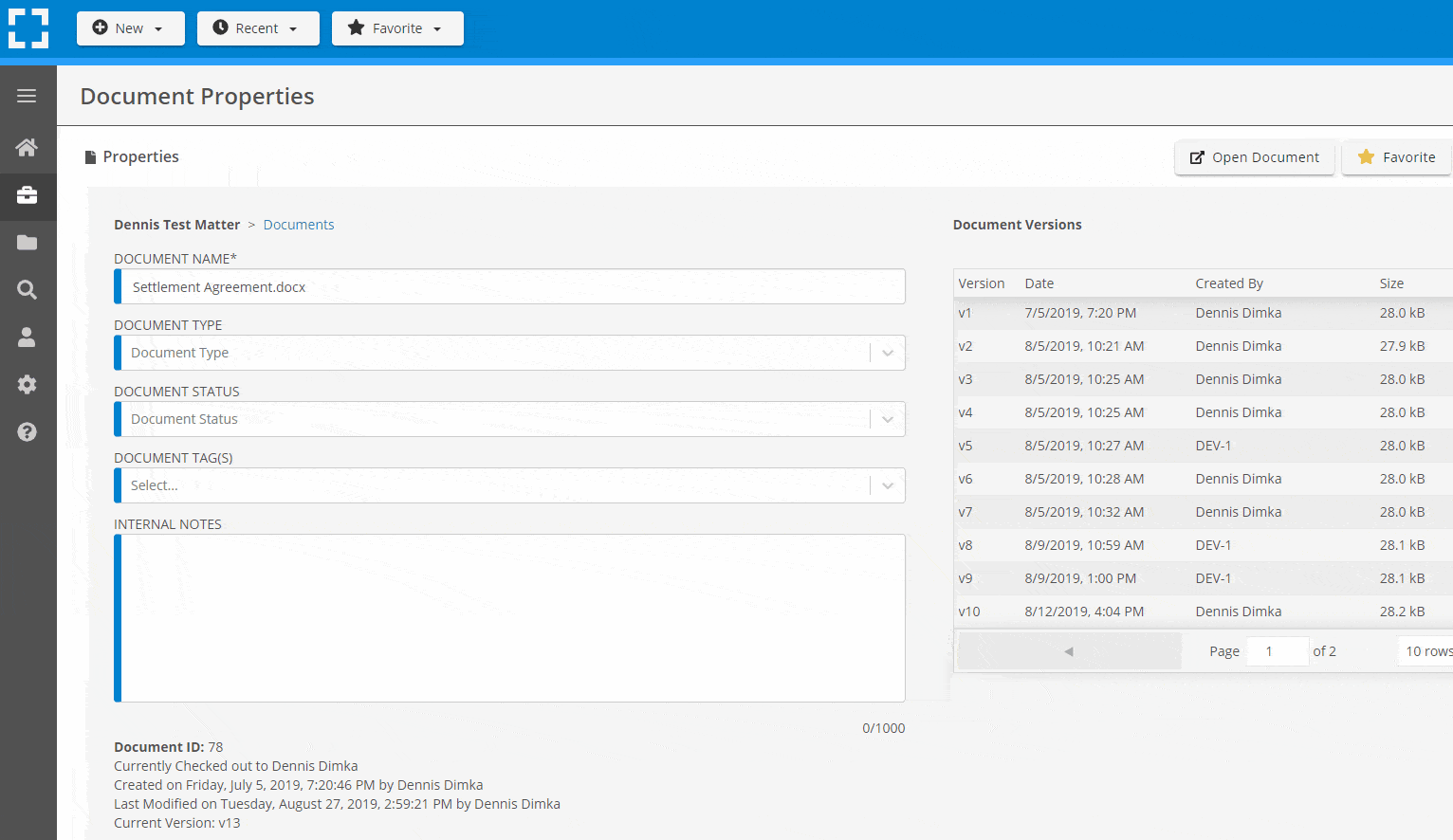
Search Everything
LexWorkplace is like Google for your law firm. Search across millions of pages, documents, folder email and notes in seconds. Refine your search by matter, document type, author and more.
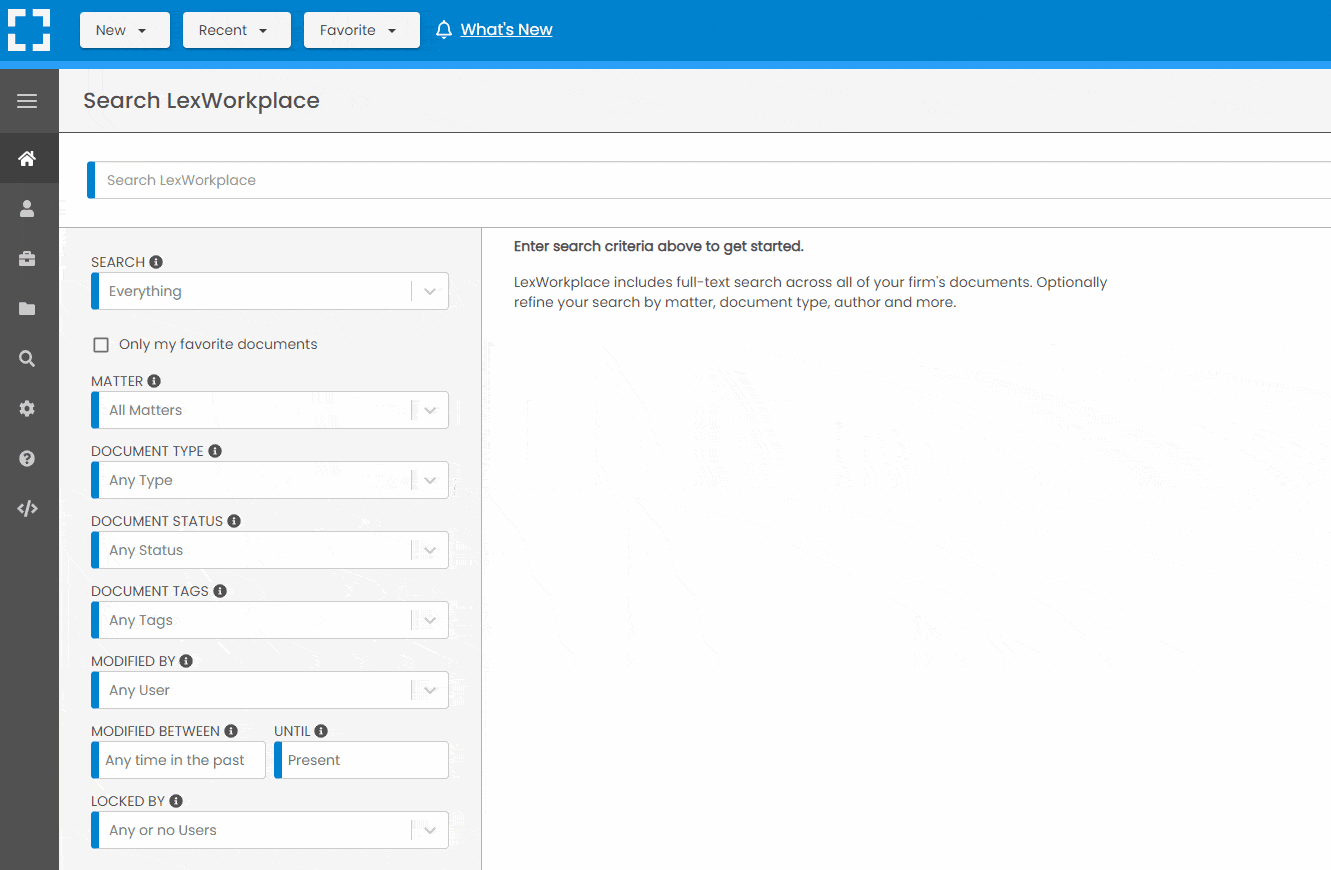
Search by…
- Client or Matter
- Document Type (Contract, Complaint, Order, etc.)
- Document Status (Draft, Final, etc.)
- Document Tags (Filed With Court, Fully Executed, etc.)
Outlook Integration + Comprehensive Email Management
Save emails to a matter without leaving Outlook. Saved emails are accessible to your entire team, organized and searchable.
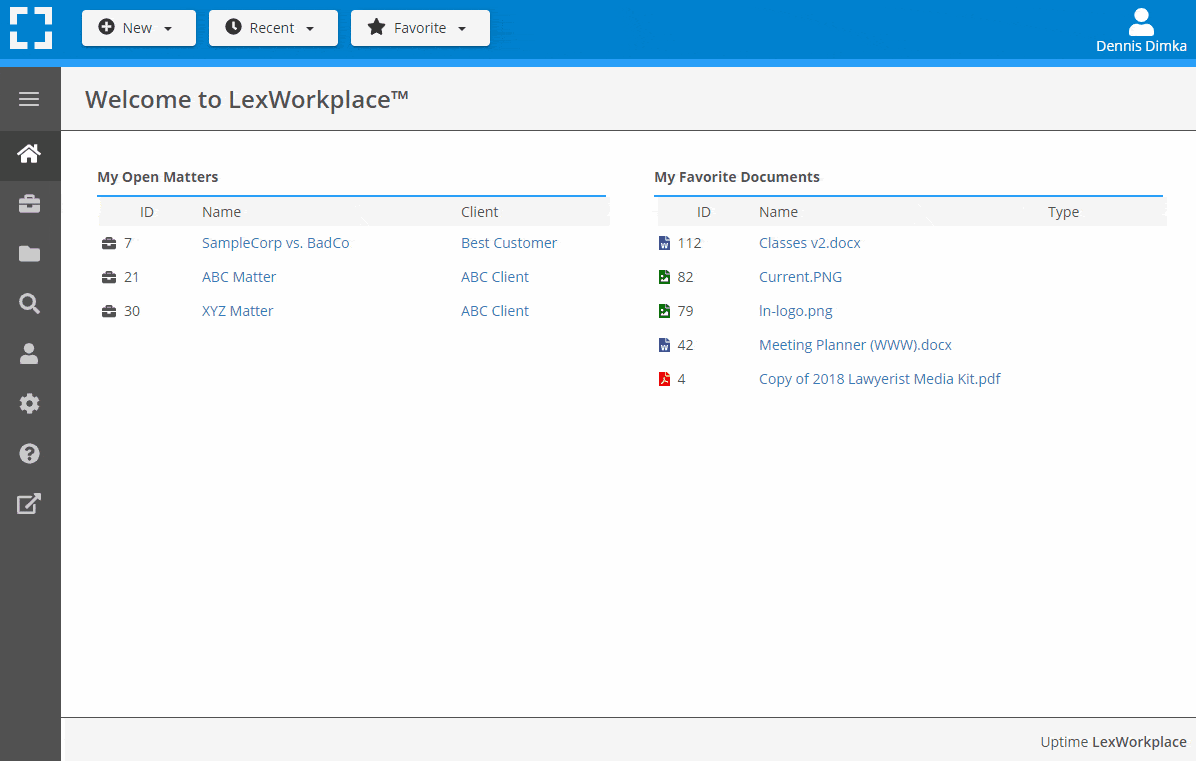
- Outlook Add-In that Works With Windows and Macs
- Save Entire, Original Email to a Matter in a LexWorkplace
- Email De-Duplication
- Organize Emails into Folders, Subfolders
Works with Windows and Macs
All of LexWorkplace is compatible with both Windows and Mac computers.
What Clients Say
Lawyers love LexWorkplace. See how the system streamlined one lawyer’s practice.
Watch the 5-Minute Demo
See LexWorkplace in action in our quick 5-minute overview and demonstration.
Or, if you want a one-on-one demo, or want to talk about LexWorkplace for your firm, schedule a call or demo below.
You Might Also Like
April 12, 2024
AI for Legal Documents: Benefits, Use Cases, and AI Tools
Discover how AI is changing legal…
March 28, 2024
Law Firm Software: Your 2024 Guide to Building Your Tech Stack
Top Law Firm Software: Practice…
Want More Legal Technology Tips?
Subscribe to Uptime Legal to get the latest legal tech tips and trends, delivered to your inbox weekly.
